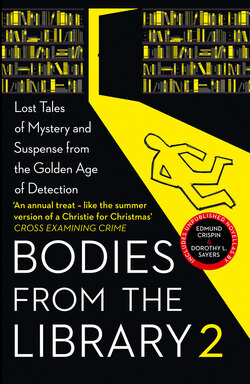Читать книгу Bodies from the Library 2 - Группа авторов - Страница 12
HELEN SIMPSON
ОглавлениеHelen de Guerry Simpson was born in 1897 in Sydney, Australia, where she was brought up on a sheep farm. At the age of seventeen, after her parents’ divorce, Simpson was sent by her father to study in France, but with the outbreak of war she travelled to England to stay with her mother. In September 1915 she went up to Oxford to read French, but after two years she left the university and joined the Women’s Royal Naval Service, working in the Admiralty as an interpreter and cipher clerk until the end of the war. A competent flautist and pianist, Simpson decided to return to Oxford, this time to read music as she now intended to become a composer. Although she composed a few songs and—in her own words—‘fragments for piano’, she soon realised that her future did not lie in music and finished without a degree.
While at Oxford Simpson became very interested in the theatre, and she founded the Oxford Women’s Dramatic Society. This led to her first book, Lightning Strikes (1918), a collection of four playlets including one in which a vampire makes a compact with the devil. She also wrote longer pieces including the fantasy Pan in Pimlico (1923) and A Man of His Time (1923), a more substantial but episodic work about the renaissance polymath Benvenuto Cellini. As well as plays, Simpson wrote poetry, and a selection was collected in the well-received Philosophies in Little (1921), together with some verse translations from French, Italian and Spanish.
Simpson’s first novel, Acquittal, was published in 1925, having been written in five weeks as the result of a bet after Simpson had described modern novels as being ‘written in six weeks by half-wits or persons under the influence of drink’. The book concerns the aftermath of a murder trial, and it sold sufficiently well for Simpson to decide to take up writing full time, always using pen and paper rather than a typewriter which, for her, would shatter ‘the peace and quietness necessary to the creative artist’, and always working in a room without a distracting view. Her next book, The Baseless Fabric (1925), was a collection of strange and sometimes sinister short stories, while the awkwardly titled Cups, Wands and Swords (1927) took her back to Oxford.
Around this time, Simpson married Dennis Browne, a fellow Australian and a children’s surgeon at the Hospital for Sick Children in London, now better known as Great Ormond Street. She also met the writer Clemence Dane. The two became firm friends, so much so that Simpson named her daughter after Dane, and they collaborated on three novel-length detective stories, two of which—Enter Sir John (1929) and Re-Enter Sir John (1932)—feature Sir John Saumarez, an actor-manager. They also co-wrote a stage play and the screenplay for Mary (1931), an atmospheric thriller directed by Alfred Hitchcock, whose film Murder! (1930) had been based on Enter Sir John. Simpson also wrote another crime novel, but without Dane. This was Vantage Striker (1931), described by one critic as ‘the jolliest murder case we’ve had for a long, long while’. Her next novel, Boomerang (1932), drew on the history of her mother’s family and won the prestigious James Tait Black Memorial Prize.
Among Helen Simpson’s many hobbies was the study of witchcraft and demonology, which were the subject of the many rare books that formed the ‘Library of the Devil’ in her London home, where she also made her own wine. In 1932, she and her husband travelled to France and Hungary to research sightings of werewolves and vampires as well as to investigate the alleged involvement of satanists in the brutal murder of a typist in Strasbourg; Simpson would draw on this research for a radio talk, ‘On Witchcraft Bound’, which made headlines when it was first broadcast by the BBC in 1934 for its frank discussion of ritual murder. She also presented radio programmes for the BBC on homecraft and cookery, and she took part in several celebrity panel shows. Simpson also continued to write. Her other novels include The Woman on the Beast (1933), a long triptych fantasy set partly in 1999, as well as two historical novels: Saraband for Dead Lovers (1935), about the doomed romance between Sophie Dorothea of Celle and Count Philip Christoph von Königsmarck, and Under Capricorn (1937), about Australia’s early settlers. As well as the libertarian organisation PEN, Simpson was a member of the Detection Club and she contributed to two of the Club’s round-robin mysteries and to The Anatomy of Murder (1936), in which Dorothy L. Sayers and others explored notorious real-life crimes—in Simpson’s case, the murder of Henry Kinder in 1865.
In 1937, Helen Simpson embarked on a lecture tour of Australia and made various broadcasts for charity. In 1939, she was chosen as a parliamentary candidate for the Liberal Party, but the General Election was postponed because of the Second World War. Her final novel, Maid No More, a strange story of slavery and Caribbean beliefs, was published in March 1940. At this time, Simpson and her husband were living in a flat above the hospital where her husband worked and, on 9 September 1940, the hospital was hit by a bomb during an air raid by the Luftwaffe; together with nursing staff and air raid wardens, they helped to extinguish the flames and move the sick children to safety. Just over a month later, the hospital where Simpson was recovering from a cancer operation was bombed and she died of shock. Her last literary assignment had been a series of articles giving a woman’s perspective of the war in response to views expressed by an American columnist.
‘Hotel Evidence’ was first published in Woman’s Journal in May 1934.
